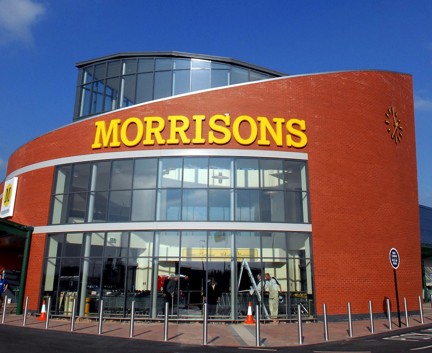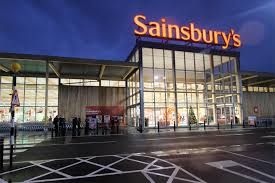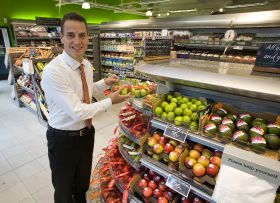Morrisons
Research by mySupermarket.co.uk in October also found that a basket of essentials rose slightly from £85.94 to £86.16 in that month
Morrisons has narrowly come out cheapest in a study of grocery essentials for the month of October.

The monthly study, conducted by mySupermarket.co.uk, the shopping and comparison website, monitors the cost of the same 35 most-commonly bought grocery products.
Overall, it found that a basket of essentials rose slightly from £85.94 in September to £86.16 in October.
The October increase was driven by a sharp rise in the cost of broccoli, up 18%, and mushrooms, up 11%. Only apples fell significantly in price, dropping 11% in price compared to September.
The small rise follows a period of falling grocery prices, with the September basket total of £85.94 having been the lowest in 2015.
mySupermarket analysed the basket cost across the top four supermarkets, Tesco, Asda, Sainsbury’s, and Morrisons, plus Waitrose and Ocado, and found significant differences in price.
Morrisons was the cheapest closely followed by Asda. Ocado was most expensive, with Waitrose coming second bottom.
In comparison to a year ago, though, the same basket in October 2014 would have cost shoppers £89.74, a saving of 4%.
Gilad Simhony, CEO of mySupermarket.co.uk, said: “One side effect of the current supermarket price war – the environment in which supermarkets are fighting for shoppers hard earned pounds – is that the cost of grocery staples are being priced very competitively.
“This is great news for shoppers who are looking to make savings. Another side effect, however, is more confusion regarding which of the supermarkets is cheapest as the price of our favourite grocery products can change on a daily basis. Shoppers need to be aware and take control of their weekly shop as the differences in price can be huge.”
Morrisons shop floor staff will now be paid £8.20 an hour, above the new national living wage of £7.20 after the review of salaries.
Morrisons has become the latest retailer to increase wages for shop-floor staff by bumping pay up to £8.20 an hour.

The pay rise, up 20 per cent from £6.83, will apply to staff of all ages and is well ahead of chancellor George Osborne’s new national living wage of £7.20, which comes into effect for over 25s in April of next year.
Morrisons said the increase is costing £40 million, and will include other changes such as removing extra pay for Sundays.
Chief executive David Potts said: “We have been listening to our colleagues who told us they want their pay to be more competitive and simpler.
“By paying a significantly higher hourly rate, we are recognising the contribution of our excellent staff, who are so important to the revival of Morrisons.”
The news comes as Lidl said it was the first UK supermarket to implement the new minimum wage as recommended by the Living Wage Foundation. Fom October, Lidl UK employees will earn a minimum of £8.20 an hour across England, Scotland and Wales, and £9.35 an hour in London.
This month Sainsbury’s also increased its standard rate for shop floor staff by four per cent to £7.36 an hour, the Guardian reported.
Gill Owen, from the Living Wage Foundation, said: “This is wonderful news from Morrisons. Lidl’s announcement has prompted a review of pay practices and it shows consumers are beginning to recognise that the living wage is an important market of a responsible business. We hope more will follow in Morrisons’ footsteps.”
Sally Sneddon, who has been at Morrisons as a buyer since 2005, replaces one-time banana buyer Mark Booth in the role.

Morrisons has appointed Sally Sneddon as its new top-fruit buyer.
Sneddon, who has been at Morrisons as a buyer since 2005, replaces Mark Booth – who was also the retailer’s stonefruit and banana buyer from 2008 to 2012 – in the position.
Sneddon began in her new role earlier this month. The change forms part of a wider reorganisation of Morrisons’ buying department.
The news comes amid a scandal engulfing the troubled big four retailer, whereby buyers at Morrisons have reportedly attempted to secure one-off payments from about 20 suppliers in a potential breach of the Groceries Supply Code of Practice, with only “a handful” blocked by the supermarket’s legal team.
An internal email from Morrisons’ legal team, allegedly seen by The Guardian, also tells buyers to get advice on how to continue to demand one-off payments from suppliers but satisfy regulators.
A spokesperson for Morrisons said: “We do have agreements with some of our suppliers that enable us to occasionally ask for support to enable us to invest in our business to the mutual benefit of Morrisons and our suppliers.”
Morrisons senior trading director Casper Meijer is latest to leave retailer as David Potts continues management clean-out
Morrisons’ senior trading director Casper Meijer has become the latest high-profile executive to leave the business as part of an ongoing management restructure by new chief executive David Potts.

Meijer, who was headhunted in 2013 from Dutch retailer Albert Heijn, was reportedly working in the UK during the week and travelling back to the Netherlands at the weekend.
He is understood to be leaving with immediate effect after refusing to base himself permanently in the UK.
Morrisons veteran and trading director for fresh Andrew Pleasance will replace him on an interim basis, but an external search for the permanent replacement has begun.
“We both believe now is the right time for this crucial role to be taken by an executive who will dedicate all their efforts to living and working here in Britain,” said Potts.
The former Tesco director has sacked several of the Morrisons senior management team since taking over in March.
Big Four retailer sincerely apologises after Amanda Janney claims to have found a slug in among broccoli and cauliflower florets
TV chef Hugh Fearnley-Whittingstall once created a series of recipes for adventurous cooks to willingly include slugs.

British student Amanda Janney claims to have had an involuntary slug cuisine experience, though.
The 20-year-old, based in Lincolnshire, had nearly eaten a whole bag of Morrisons own-brand frozen veg – which includes renowned UK produce such as broccoli and cauliflower – when she says she found the slug.
She told the Daily Star: “I had about one or two bowls left and put some in the microwave. But when I went to pour the bowl out onto my plate I saw something dark.
“I picked it up thinking it was just a burnt bit of veg and then saw it was a slug.”
A spokesperson for Morrisons said: “Despite the rigorous checks and quality control we ask all of our suppliers to have in place, there are very rare occasions where objects are not detected.
“We apologise to Amanda and have already offered her a gesture of goodwill.”
Supermarkets need to shut stores to save costs, as price cuts are ‘not enough’ to fend off competition from discounters
Retailers must shut down one in five of their stores in order to turn around flagging sales figures and reboot the grocery market, a report has said.
A large-scale closure programme is the “only viable solution” to return to profitable growth for the major supermarkets, the study found, and said price cuts alone will not win the battle against hard discounters Aldi and Lidl.
“We believe that any major price investments by Morrisons, Sainsbury’s or Tesco can be exceeded by the discounters,” said analyst Rob Joyce of report authors Goldman Sachs.

The report found that as over half of Tesco’s stores are bigger than 40,000 sq ft, the UK’s largest retailer will have the biggest problem.
And it said that multiple supermarkets would suffer like-for-like sales declines of three per cent a year until 2020, unless they begin to close stores.
“Our analysis of the UK grocery industry suggests capacity exit is the only viable solution for a return to profitable growth,” the report said.
The latest grocery share figures from Kantar Worldpanel, published today for the 12 weeks ending 9 November 2014, show that all the top four retailers have lost market share, while Aldi and Lidl have grown (up 25.5% and 16.8% respectively).
Fraser McKevitt, head of retail and consumer insight at Kantar, said: “The declining grocery market will be of concern to retailers as they gear up for the key Christmas trading season. The fight for a bigger share of sales has ignited a price war which means an average basket of everyday goods such as milk, bread and vegetables now costs 0.4% less than it did this time last year. This is bad news for retailers, but good news for shoppers with price deflation forecast to continue well into 2015.”
Sainsbury’s has announced a £150m investment in price cuts as it revealed a 2.1% fall in like-for-like sales.
Sainsbury’s released its interim results for the 28 weeks ending 27 September 2014, showing underlying profit before tax down 6.3% to £375m from £400m in 2013/2014. Underlying basic earnings per share were also down significantly, by -12.7% to 14.5p compared with 16.6p in 2013/2014.
The supermarket, alongside Tesco, Asda and Morrisons, has been hard-hit by the success of discount brands Aldi and Lidl.

To combat this, Sainsbury’s said it would invest £150m in reducing prices, half of which will fall in the second half of 2014/15 and the remainder in the first half of 2015/16.
Moreover, Sainsbury’s stated it would work closely with its suppliers to provide lower prices for it customers and “deliver value chain efficiencies which can be reinvested in price”.
Chief executive Mike Coupe said Sainsbury’s would continue to put customers first: “We will continue to differentiate ourselves from a position of strength by offering great products and services at fair prices, investing in the quality of our food and investing in price in areas where our customers tell us it matters most. By knowing our customers better than anyone else, we will continue to serve them through multiple channels and in ways that make their lives easier, regardless of changes in the market. Our colleagues will remain our greatest asset; we will invest in their training and development to ensure they can continue to deliver industry-leading service.”
David Tyler, chairman, said: “The UK grocery sector has become increasingly challenging in recent months. As a result, we have evolved our strategy and believe this will allow us to build on our heritage and past success, especially as it will be delivered by the most experienced management team in the industry.”
Total sales also fell by 3.6%, but retailer says long-term plans such as moving packing operations to UK yet to benefit sales.
Morrisons like-for-like sales fell 6.3% in the third quarter of the year, with total sales excluding fuel down by 3.6%.
But the UK’s fourth largest retailer insisted that the results, for the 13 weeks to 2 November, showed “continued progress” on a three-year plan.
A company statement said it will take time for initiatives such as the launch of its Match & More card, which compares prices with discounters Aldi and Lidl, to fully benefit sales performance.

And it said that a proposed closure of its Netherlands-based produce packing facility Bos Brothers BV is expected to transfer operations to growers or existing Morrisons produce facilities in the UK during 2015.
An improved IT platform, simplifying the range and restructuring teams were also listed as ways in which the retailer is cutting costs.
During the last quarter, Morrisons opened 12 new M local stores and three new core stores, and said it is on schedule to open between 60-70 further M local stores by the end of the year.
“Morrisons is meeting the challenges created by a period of intense industry competition and structural change with quick and decisive action,” said chief executive, Dalton Philips. “I am encouraged by the further progress we have made, especially on a number of key operational measures, cash flow and costs.
“The launch of the Match & More card was another big move for Morrisons. We are the only supermarket that is price matching the discounters and the successful launch last month was a testament to the positive way our 120,000 colleagues are delivering innovation and embracing the changes at Morrisons,” he said.
Morrisons said it now expects underlying profit before tax to be in the narrower range of £335m to £365m (previously £325m-£375m), after £65m of new business development costs and £70m of one-off costs.
Retailer launches new price match scheme that compares with Aldi and Lidl as well as top four on branded and own-brand items
Morrisons has launched the first-ever price match scheme that compares with discounters Aldi and Lidl, as well as Tesco, Sainsbury’s and Asda.
The scheme, named ‘Match and More’, will refund any differences in price of comparable products as points onto cards, using price data from independent analysts Profitero.

The retailer said that if Lidl is 60 pence cheaper than Morrisons then 600 points are added to a shopper’s Match & More account.
It will launch as a phased roll-out starting today (3 October) and will be in stores in time for Christmas.
When 5,000 Match & More points are collected the customer receives a £5 voucher at the till, while shopper information from the cards will be collected and used to tailor future offers.
Morrisons CEO Dalton Philips said the retailer has learned from other price match programmes so customers will not collect lots of small vouchers or have to redeem them online when they get home.
“Because it price matches the discounters, the Match & More card will provide the ultimate guarantee about Morrisons’ value-for-money,” he said.
Morrisons said it also has plans to allow points to be redeemed as vouchers for leisure activities such as eating-out and travel.
Price matched products will cover branded and own-brand products as well as items that are on promotion elsewhere.